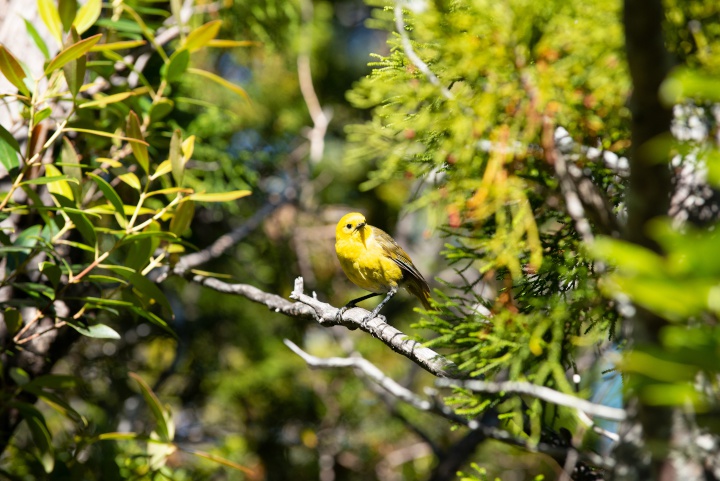Missing Mohua Return After 20-year Absence
The chatter of mohua/yellowhead can once again be heard in the Poulter valley in Arthur’s Pass National Park after a 20-year absence after the release of 41 birds there yesterday.

The sparrow-sized birds were flown from pest-free Te Kakahu-o-Tamahia/Chalky Island in Fiordland and join other small mohua populations in nearby Canterbury valleys, re-introduced over the past 14 years.
Mohua, a Ngāi Tahu taonga species, is a native forest bird with a bright yellow head and breast that was once one of the most abundant and conspicuous birds in South Island beech forests.
However, mohua have been lost from most forested areas due to being preyed on by rats and stoats as they nest and roost in holes in trees.
Department of Conservation Biodiversity Threats Advisor Marion Rhodes says the goal is to return mohua to the Canterbury valleys where it once thrived.
“Intensive predator control to protect the critically endangered kākāriki karaka/orange-fronted parakeet that live in these valleys has also created favourable conditions for mohua.
“We’ve seen mohua numbers in the Hurunui South Branch increase to well over 100 birds and the smaller Hawdon valley population is also showing promise,” says Marion Rhodes.
“We’re hoping that the new arrivals will settle in the Poulter and those that disperse will join the established birds in the other valleys.”
Te Ngāi Tūāhuriri Rūnanga DOC Liaison Arapata Reuben says after many years of hard mahi with DOC to remove predators, the hapū are very blessed with the return of their taonga manu to Poulter valley.
“We hope mohua will thrive in their kāinga and that their waiata fills the ngahere (forest) once again. One day when their population has grown and it is sustainable to do so, our weavers will once again be able to use their feathers for weaving, just like their tīpuna did so many generations ago.
“As Taane Tiki, the first-born son of Tūāhuriri said when claiming Whata-a-rama (Mount Otarama) – ‘Ko te maunga ko Te Whata-a-rama, te manu o reira, he kākāpō. Moku tēnā maunga kia maro ai a Hine-mihi rāua ko Hutika.’ – The maunga Whata-a-rama is the mountain of parrots and will be mine to clothe my daughters Hine-mihi and Hutika,” says Arapata Reuben.
Te Ngāi Tūāhuriri Rūnanga are mana whenua and kaitiaki of Poulter valley and Arthur’s Pass National Park.
The translocation has been made possible with the support of the Mohua Charitable Trust and Rātā Foundation, which funded all the flights.
Mohua Charitable Trust founder and Chairman Nigel Babbage says this is a great day for this iconic species, which is featured on the NZ $100 note.
“Back in 2007 there were only eight known mohua in Canterbury and now, due to previous translocations, the population numbers in the hundreds. We are stoked that this release will further enhance the mohua population and the genetic diversity of birds within it.”
Arthur’s Pass and surrounding areas previously hosted large numbers of mohua, but they were mostly gone by the 1980s. Birds that hung on in the Hawdon and Hurunui South and North branches were all but wiped out by an upsurge of predators after a double beech mast (seeding) in 1999 and 2000.
Mohua were successfully reintroduced into the Hurunui South Branch in Lake Sumner Forest Park, with two releases in 2008 and 2009. They were also returned to the Hawdon valley in 2014, with a second release in 2017.
Rats, stoats, and possums are now kept to low levels through extensive trapping and use of aerial 1080 when rat numbers rise to threatening levels. This work is focussed on protecting kākāriki karaka but also supports other threatened species like roroa/great spotted kiwi, pīwauwau/rock wren and mohua, kākā, kea and toutouwai/South Island robin.


 Gordon Campbell: On Why We Can’t Survive Two More Years Of This
Gordon Campbell: On Why We Can’t Survive Two More Years Of This Queenstown Lakes District Council: Top 10 Most Hazardous Items Found In QLDC’s Waste Facilities And Rubbish And Recycling Bins In 2024
Queenstown Lakes District Council: Top 10 Most Hazardous Items Found In QLDC’s Waste Facilities And Rubbish And Recycling Bins In 2024 NZ Government: Drive Safely This Summer
NZ Government: Drive Safely This Summer Northland Inc: Game-Changing Investment For Northland - Resilience Fund Allocates $250,000 To Health Simulation & Training Centre
Northland Inc: Game-Changing Investment For Northland - Resilience Fund Allocates $250,000 To Health Simulation & Training Centre Interchurch Bioethics Council: Church Bioethics Agencies Express Dismay at the Rushed Consultation Period for Submissions on the Gene Technology Bill
Interchurch Bioethics Council: Church Bioethics Agencies Express Dismay at the Rushed Consultation Period for Submissions on the Gene Technology Bill New Zealand Police: More Than $2.5m Worth Of Assets Restrained In Undeclared Tobacco Case
New Zealand Police: More Than $2.5m Worth Of Assets Restrained In Undeclared Tobacco Case SPCA: Survey Shows Government Lacks Mandate To Repeal Live Export Ban
SPCA: Survey Shows Government Lacks Mandate To Repeal Live Export Ban


